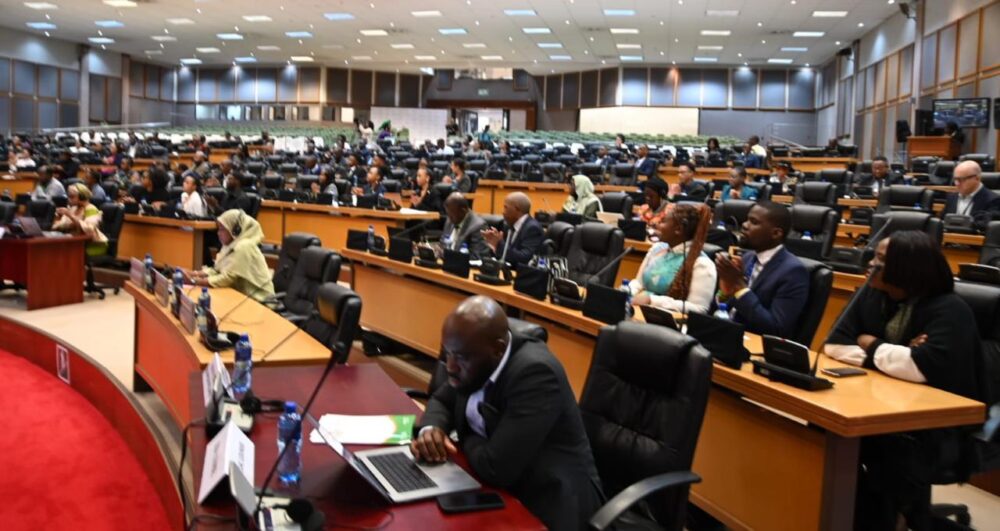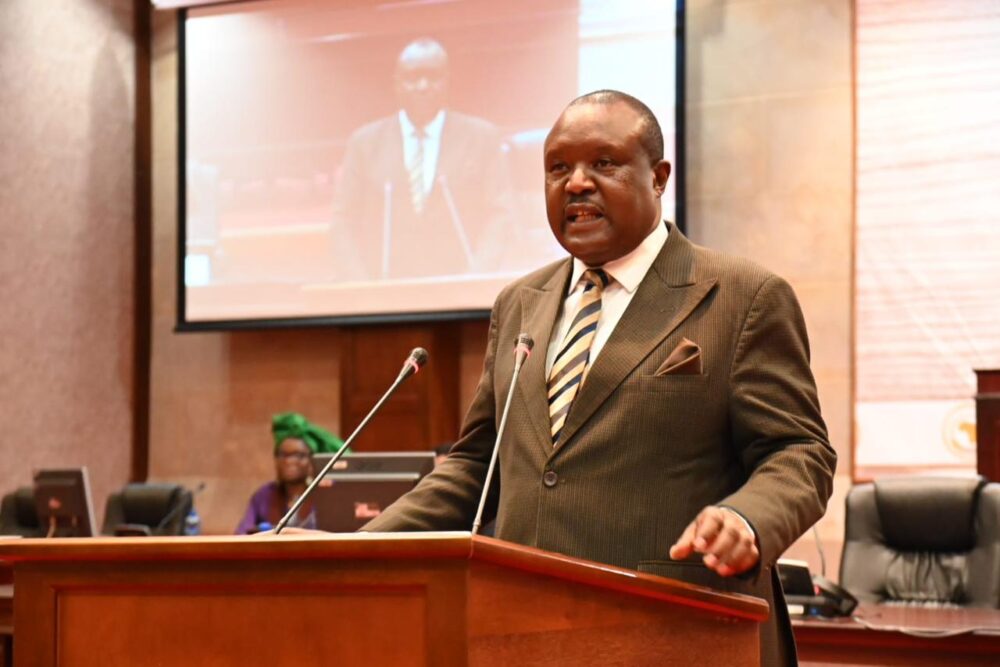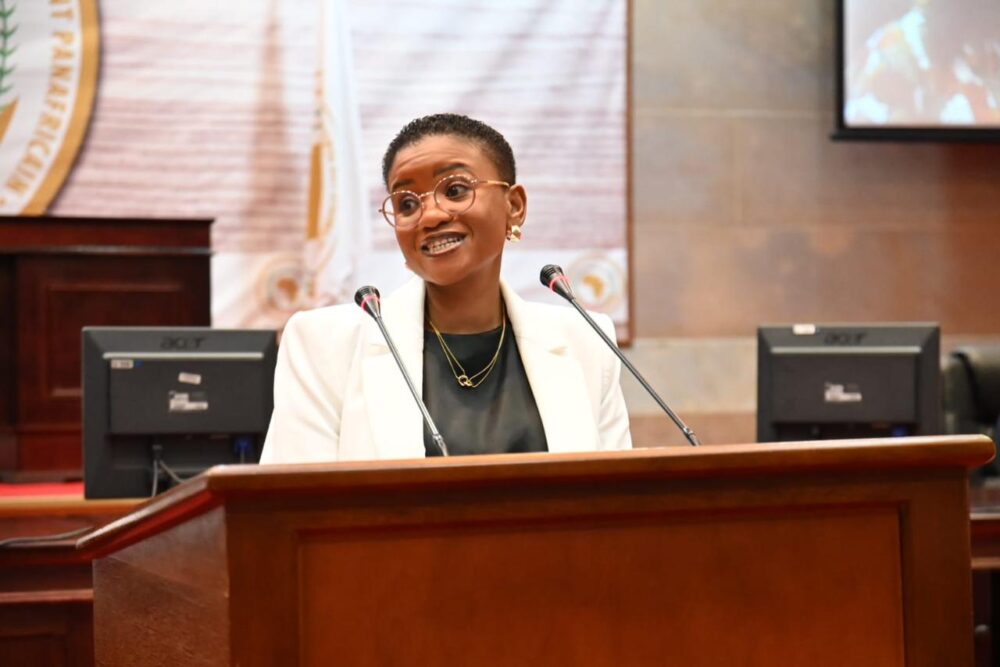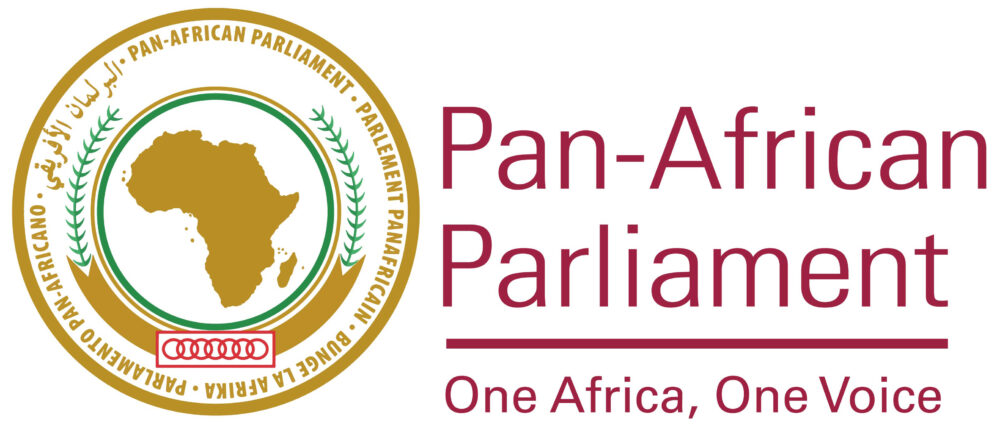Former African Union Chairperson, Dr Nkosazana Dlamini- Zuma giving her keynote address at the 3rd Civil Society Parliament dialogue at the Pan African Parliament in Midrand
Former African Union (AU) Chairperson Dr Nkosazana Dlamini-Zuma has hailed the Pan-African Parliament (PAP) Civil Society Forum for giving African citizens a stronger voice in shaping continental decisions during the third Civil Society-Parliament Dialogue in Midrand.
The annual dialogue, held on 8 November, was organised by the Centre for Human Rights at the University of Pretoria, in partnership with the Open Society Foundations (OSF) and the Pan-African Parliament. The gathering reaffirmed a shared commitment to strengthening collaboration between the continental parliament and civil society organisations (CSOs) across Africa.
The forum brought together civil society organisations, academics and legislators from AU member states to deliberate on key issues of democracy, human rights, governance and peacebuilding on the continent.
Addressing delegates, Dlamini-Zuma said the strength of any parliament lies in its connection with the people it represents.

Without active public participation, she cautioned, legislatures risk becoming echo chambers where the same ideas circulate without real change.
“The participation of civil society brings the voices of the people into the heart of African decision-making in the continent’s legislative processes,” she said.
Unpacking the theme, ‘Year of Reparations: Justice for Africans and People of African Descent through Reparations,’ Dlamini-Zuma said the AU has long recognised the need for reparations as a moral, historical and economic issue tied to Africa’s colonial past, slavery and exploitation.
“Reparations are essential for justice, healing and development. They remain a key part of the African Union’s 50-year strategic framework, Agenda 2063,” she said.
Dlamini-Zuma recalled the 1993 Conference on Reparations held in Nigeria, where it was resolved that the West owed Africa a moral, economic and historical debt.
“The conference concluded that reparations must take multiple forms, including financial compensation, debt cancellation, the return of stolen cultural artefacts and the transfer of technology,” she said.
She further reminded delegates that in 2001, South Africa hosted the World Conference Against Racism, Racial Discrimination, Xenophobia and Related Intolerance in Durban.
“That conference declared slavery — particularly the transatlantic slave trade — a crime against humanity. It also identified colonialism and apartheid as root causes of the deep and enduring social and economic inequalities we see today and called for reparations,” Dlamini-Zuma added. “Importantly, it linked poverty to the historic exploitation of African and Indigenous peoples.”
Dlamini-Zuma noted that, following the Durban conference, the United Nations (UN) committed to pursuing reparatory justice. However, she added that, decades later, reparations remain an unfulfilled promise.
She emphasised that the theme calls on Africans and the global community to confront historical injustices with courage and vision, saying that the legacies of slavery, colonisation and exploitation continue to shape the present.
“True liberation cannot exist without justice and reparatory action,” Dlamini-Zuma declared.

Welcoming civil society organisations, President of the Pan-African Parliament, Chief Fortune Charumbira, reaffirmed the institution’s leadership in advancing Africa’s collective voice on justice, sovereignty and human rights. He emphasised that the call for reparations goes beyond financial compensation, saying it embodies the restoration of dignity, identity and economic empowerment.
“Our call for reparations is not a cry of victimhood,” Charumbira said. “It is a demand for justice and self-determination — a call for Africa to speak with one voice and act with one purpose to correct the injustices that have shaped our past and continue to define our present.”
Charumbira reaffirmed the PAP’s role as a vital platform for civil society organisations to engage, influence and shape Africa’s development agenda.
He said the parliament remains open to civil society to ensure that citizens’ voices influence decision-making at the highest level.
“We are proud to engage with civil society in finding practical solutions to Africa’s challenges and improving the lives of our people. The success of this parliament depends on strong collaboration with civil society. This parliament was established to ensure that the voices of African people permeate through and reach all heads of state,” he said.
This, he noted, is in line with Article 17 of the Malabo Protocol, which calls for mechanisms that promote civil society participation in the work of the Pan-African Parliament.
Speaking on the role of civil society in the work of the Pan-African Parliament, Advocacy Advisor for the OSF, Jeggan Grey-Johnson, stated that civil society brings valuable Africa-centred knowledge and expertise to policymaking.
“What we bring to the table as African citizens is not confrontation or disruption, but knowledge grounded in our lived realities and professional expertise,” Grey-Johnson told parliamentarians.
“We generate knowledge from an African perspective, and we hope that institutions like this parliament will serve as incubators of such knowledge to shape sound, people-centred policies. Gone are the days when policies were designed outside this continent and handed to us in piecemeal. Each of us here must be recognised as a strategic asset — contributing through knowledge generation, data analysis and the use of technology to help this parliament deliver on its mandate.”

Bonolo Mokgale, the convenor of the PAP CSO Forum and Programme Manager: Democracy and Civic Engagement Unit at the Centre for Human Rights at the University of Pretoria, shared Grey-Johnson’s sentiments.She spearheaded the establishment of the Pan-African Civil Society Forum to advance participatory democracy.
“We stand here today, at the third edition of this dialogue, because the Pan-African Parliament opened its doors — because our partners across the continent believed in shared governance, and because honourable members of this parliament recognised that legitimacy is strengthened, not weakened, when civil society has a formal voice in these halls. What began as an idea born of constitutional obligation has now evolved into an institution built on collaborative commitment.”
Mokgale noted that the dialogue came at a time of “profound complexities” on the continent, citing growing democratic and governance challenges in the Sahel region, as well as ongoing conflicts in the eastern Democratic Republic of Congo and South Sudan.
“Millions of Africans wake up each morning uncertain whether democracy will protect them, or whether they will once again fall victim to the abuse of power. Across the Sahel, we are witnessing something deeply troubling — not merely the overthrow of governments, but a challenge to the very essence of democracy itself. When military takeovers are met with applause rather than condemnation, and when young people place more faith in soldiers than in statesmen, we must ask ourselves difficult questions about what democracy truly means in the lives of ordinary Africans,” she said.
She stressed that this was not merely a story of coups, but one of crises of legitimacy — a reflection of a social contract under severe strain.
Mokgale warned that when democracy is stripped of its substance and reduced to a mere procedure, it creates fertile ground for its value to be questioned and for authoritarian alternatives to seem appealing.
“Our obligation is clear,” she said. “The solutions we develop here must not remain within these walls but must reach our communities. The work begins today because civil society carries the wisdom of the people.”
Civil society representative Nuruthudah Okwayo said the dialogue was vital as it placed community voices at the heart of continental decision-making.
She noted that with Africa’s youth making up 60% of the population, they must be recognised not merely as beneficiaries but as active partners in crafting African-led solutions.
Governance and human rights expert Achieng Akena expressed satisfaction that engagements between civil society and parliament, which began in 2008, have now become more structured and institutionalised.
“This ensures continuity in our discussions, even as parliamentarians change,” she said.
Echoing similar sentiments, Andrew Songa, Regional Advisor for AU Engagement at the European Partnership for Democracy, hailed the forum as a powerful platform for civic engagement — one that opens the door for ordinary citizens to influence, shape and define policies that affect their lives.
